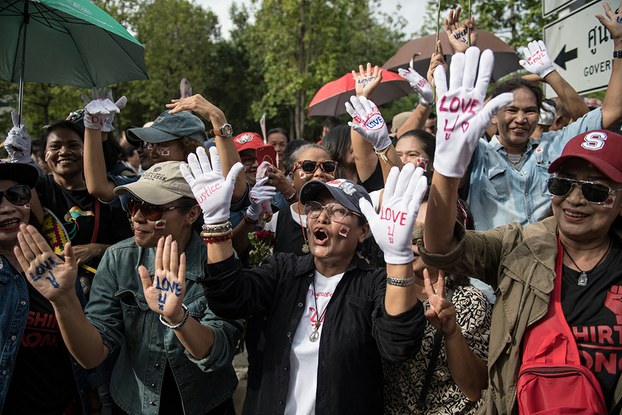




UPDATED at 3:32 P.M. on 2017-08-28
Cambodia’s government has denied reports that Thailand’s former Prime Minister Yingluck Shinawatra fled the country via Cambodia ahead of a court verdict for her alleged role in a rice-subsidy scheme that could have seen her jailed for a decade.
On Friday, a source close to an aide of Yingluck told BenarNews, an RFA-affiliated online news service, that she had traveled through Thailand’s Trat province, about 320 kilometers (200 miles) south of Bangkok, before crossing into Cambodia to board a plane that took her to another country a few days earlier.
“Her aide assisted and they went to Cambodia and assisted her flying from there,” said the source, who asked not to be identified and declined to name her final destination.
The Bangkok Post also quoted sources on Saturday as saying that Yingluck had first traveled to Cambodia’s capital Phnom Penh “where she received assistance from various powerful figures in the country” before flying to Dubai, possibly via Singapore.
Yingluck’s older brother, Thailand’s former Prime Minister Thaksin Shinawatra is believed to have been living in exile in Dubai for years after a military coup removed him from office in 2006.
In response to the reports, Cambodia’s Ministry of Interior spokesperson Khieu Sopheak told RFA’s Khmer Service Saturday that Yingluck had not entered the country.
“Our country is not a place for such fugitives to seek refuge,” he said.
“We would enforce the law if an arrest warrant has been issued by the court for her.”
Khieu Sopheak went on to say that Cambodia has no extradition treaty with Thailand, although the two countries signed one in Bangkok on May 6, 1998.
On Sunday, Cambodia’s Minister of Information Khieu Kanharith posted the comment “Yingluck didn’t use Cambodia to escape” on his Facebook page, attributing it to the country’s Prime Minister Hun Sen.
The Phnom Penh Post quoted Chhay Buna, who is in charge of border checkpoints, on Sunday dismissing reports that Yingluck had entered Cambodia as a “rumor, and not true,” adding that no one had seen her do so.
The paper also cited a spokesman for the Ministry of Interior’s Immigration Department, Lieutenant General Kerm Sarin, as saying there was no report in the system of Yingluck having departed to Singapore from Cambodia, or of her being issued a Cambodian passport, referring to another claim in the Bangkok Post report.
Reports over the weekend suggested that some state officials in Thailand were complicit in Yingluck’s escape and may have facilitated her travel to Cambodia—the timing of which remains unclear.
Yingluck failed to appear in court Friday to hear the final judgement in her rice scheme trial, and her lawyer Norawit Lalaeng told Chief Judge Cheep Chulamon that she had Ménière's disease—which causes vertigo and ringing in the ears—and could not attend for the verdict.
Cheep said at the hearing that the court did not believe Yingluck was too sick to appear and issued a warrant for her arrest.
Before issuing the warrant, the court ordered two of Yingluck’s former commerce ministers to serve prison terms for their roles in the rice scheme. Boonsong Teriyapirom and Poom Saraphol were sentenced to 42 and 36 years in prison, respectively, for falsifying deals with China in 2013.
Yingluck has not been charged with corruption, but a conviction for negligence in the bungled scheme carries up to 10 years in prison and a life ban from politics.
Rice scheme
Yingluck, 50, made history in 2011 when she became the nation’s first female leader on a wave of popular support. The criminal charges stemmed from her administration’s scheme to buy entire rice crops at prices well above the market rate.
In a bid to influence the world rice market, she encouraged rice farmers to store their crops in government silos and gave advance payments of 15,000 baht (U.S. $450) per ton. At the time, rice sold for 9,000 baht (U.S. $270) per ton.
The program, riddled with graft, failed as the global rice market tanked. Officials appraised the loss at 178 billion baht (U.S. $5.3 billion), from 2012 to 2014, when the government was left with warehouses full of overpriced crop that eventually rotted in silos.
Yingluck’s popularity grew among the nation’s 23 million farmers, a group representing more than half of the nation’s voting population. But worldwide prices never reached the advance price.
In May 2014, Yingluck’s term as prime minister abruptly ended when the constitutional court forced her to step down after finding her guilty of abusing power. During the same month, members of the Royal Thai Armed Forces launched a coup d’etat, the 12th since the end of absolute monarchy in 1932.
In September 2016, the Comptroller General ordered Yingluck to repay 35.7 billion baht (U.S. $1 billion) from a civil case related to the rice scheme. Last month, authorities froze 12 of her bank accounts.
Yingluck, whose net worth is about U.S. $17 million (565 million baht), said the case against her is politically motivated. In court earlier this month, she proclaimed her innocence and begged the judges to not let politics or Thailand’s junta sway their ruling.
“I did not do anything wrong,” Yingluck told the court. “As an upcountry woman who saw farmers—the backbone of the nation—living in horrible conditions, I tried to help them out.”
Reported by RFA’s Khmer Service and BenarNews, an RFA-affiliated online news service. Translated by Nareth Muong. Written in English by Joshua Lipes.